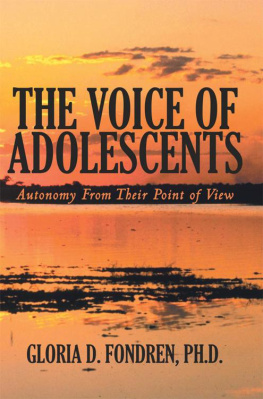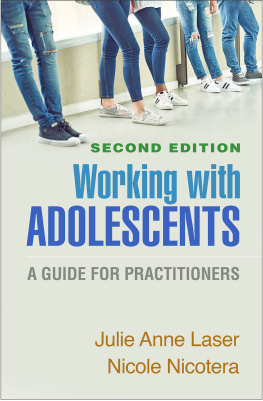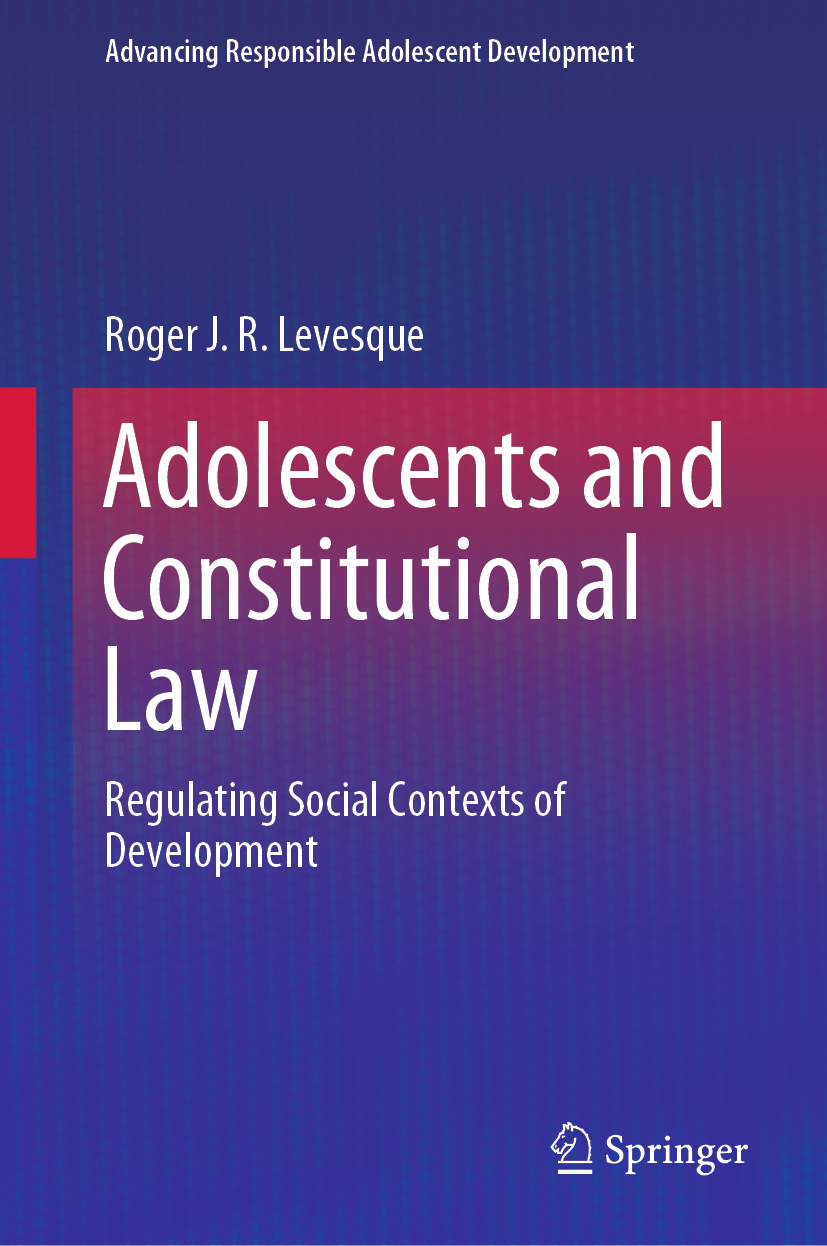Advancing Responsible Adolescent Development
Series Editor
Roger J. R. Levesque
Department of Criminal Justice, Indiana University, Bloomington, IN, USA
Brief Overview
This series advances disciplinary and multidisciplinary inquiry into the individual, social, biological, and institutional responses to adolescents and their development. It champions research that examines conditions that either stifle or enhance responsible development.
Description
Responsible adolescent developmentone that is healthy, fulfilling, engaged, and respectful of ones self and othersrequires responsive relationships with families, peers, neighbors, schools, community organizations, religious institutions, and other socializing systems. All these socializing influences reach optimal effectiveness when reinforced by appropriate social policies and norms at local, cultural, state, national, international and global levels. This series examines the wide variety of sources that shape responses to adolescents and responsible development. This series explores these complex sources by exhibiting theories, models, research studies, and symposia that examine multiple dimensions of adolescent development.
Drawing from numerous disciplines, the series examines dimensions and experiences of adolescent development that contribute to responsibility (including irresponsibility) in multiple contexts and settings. The focus on multiple arenas of development necessarily encompasses the need to center on adolescents as well as on the conditions in which they live. Thus, the series publishes manuscripts that speak to issues adolescents face, but does not require that texts directly study adolescents themselves. Manuscripts may examine images and portrayals of adolescents through, for example, cultural assumptions of parenting, media depictions, religious groups proselytizing, schoolings hidden curriculum, justice systems presumptions, clinicians interventions, and many other potential influences on adolescent development. The broadening of the disciplinary and multidisciplinary study of adolescence, however, does not mean that the series ignores core issues from adolescents own perspectives, such as adolescents experiences with significant others and with the wide variety of tasks, risks, and opportunities they encounter.
More information about this series at http://www.springer.com/series/7284
Roger J. R. Levesque
Adolescents and Constitutional Law
Regulating Social Contexts of Development
Roger J. R. Levesque
Department of Criminal Justice, Indiana University, Bloomington, IN, USA
ISSN 2195-089X e-ISSN 2195-0903
Advancing Responsible Adolescent Development
ISBN 978-3-030-26638-7 e-ISBN 978-3-030-26639-4
https://doi.org/10.1007/978-3-030-26639-4
Springer Nature Switzerland AG 2019
This work is subject to copyright. All rights are reserved by the Publisher, whether the whole or part of the material is concerned, specifically the rights of translation, reprinting, reuse of illustrations, recitation, broadcasting, reproduction on microfilms or in any other physical way, and transmission or information storage and retrieval, electronic adaptation, computer software, or by similar or dissimilar methodology now known or hereafter developed.
The use of general descriptive names, registered names, trademarks, service marks, etc. in this publication does not imply, even in the absence of a specific statement, that such names are exempt from the relevant protective laws and regulations and therefore free for general use.
The publisher, the authors and the editors are safe to assume that the advice and information in this book are believed to be true and accurate at the date of publication. Neither the publisher nor the authors or the editors give a warranty, expressed or implied, with respect to the material contained herein or for any errors or omissions that may have been made. The publisher remains neutral with regard to jurisdictional claims in published maps and institutional affiliations.
This Springer imprint is published by the registered company Springer Nature Switzerland AG
The registered company address is: Gewerbestrasse 11, 6330 Cham, Switzerland
Contents
About the Author
Roger J. R. Levesque
J.D. (Columbia Law School), Ph.D. (Psychology, the University of Chicago), is Professor of Criminal Justice and (affiliate) Law at Indiana University and Editor-in-Chief of the Journal of Youth and Adolescence . Prior to his current faculty position, he was Professor of Psychology and Law at the University of Arizona. Dr. Levesques research focuses on the legal regulation of families and the nature of children/adolescents rights. In addition to having published numerous journal articles, Dr. Levesque is the author of thirteen books (and editor of one) dealing mainly with the nature of family life and the laws that shape our intimate lives. His recent texts include The science and law of school segregation and diversity (Oxford 2017); Adolescence, privacy and the law: A developmental science perspective (Oxford 2016) and A dolescence, discrimination, and the law: Addressing dramatic shifts in equality jurisprudence (NYU 2015). His book Adolescents, Media, and the Law (Oxford University Press in 2007) won the outstanding book award from the American Law/Psychology Association and another, Not by Faith Alone: Religion, Law and Adolescence (NYU 2002) won the Society for the Study of Adolescence 2004 best authored book award. He also is editor of the five-volume Encyclopedia of Adolescence (2nd ed.) (Springer 2018).
Springer Nature Switzerland AG 2019
R. J. R. Levesque Adolescents and Constitutional Law Advancing Responsible Adolescent Development https://doi.org/10.1007/978-3-030-26639-4_1
1. Adolescents in Constitutional Law
Roger J. R. Levesque
(1)
Department of Criminal Justice, Indiana University, Bloomington, IN, USA
Roger J. R. Levesque
Email:
Keywords
Adolescents Juvenile rights Childrens rights Minors
Diversity and change mark the adolescent period. It stretches from pre-puberty through puberty to young adulthood, which typically ranges from ages 10 to 19. Despite that broad range, who is considered an adolescent varies: some can be younger or older, depending on cultural, social, and individual factors. There also is much diversity in the social, physical, mental, and emotional changes common to adolescents . Even individual adolescents own diversity can change; all markers used to designate diversity, including racial and sexual identity, develop through adolescence. By definition, adolescents are people becoming someone else.
The legal system acknowledges adolescents diversity and transitional state. Notably, it varies legal ages at which adolescents can undertake adult responsibilities sufficiently to support assumptions that they can control their own rights. When it does so, the system presumes that adolescents are less in need of adults protections, able to engage in freedoms that adults have, and can be held accountable for their actions. The legal system does so, for example, when it recognizes that some adolescents have capacities and responsibilities similar to those of adults or when it recognizes that adolescents actions are similar to those of adults.









